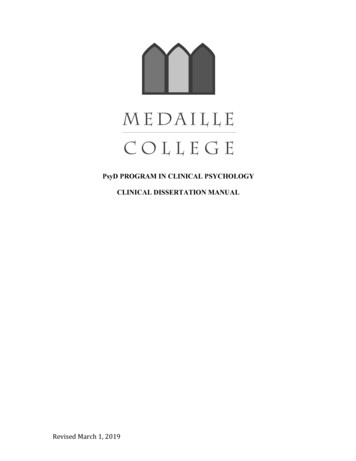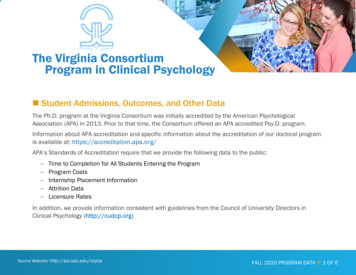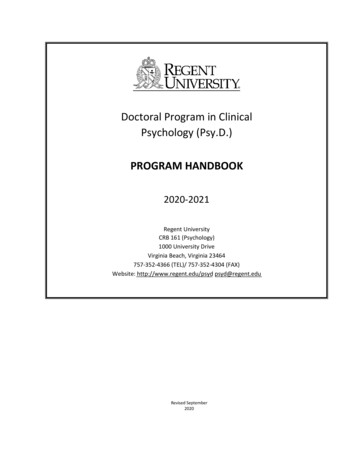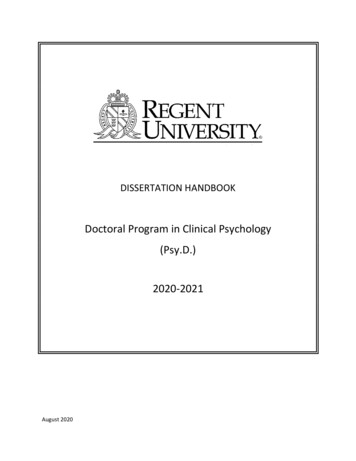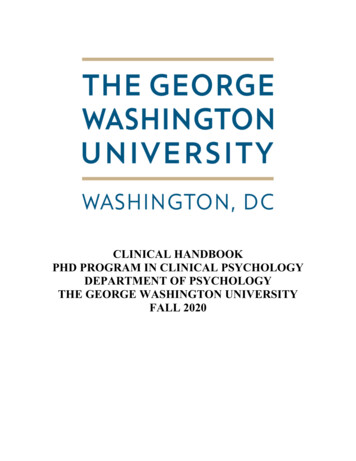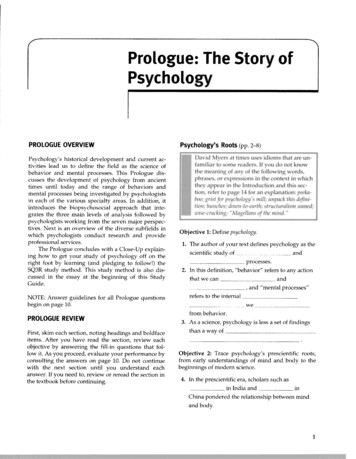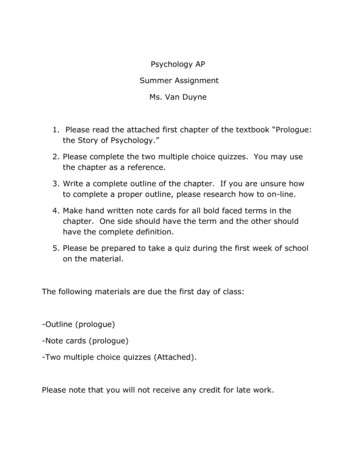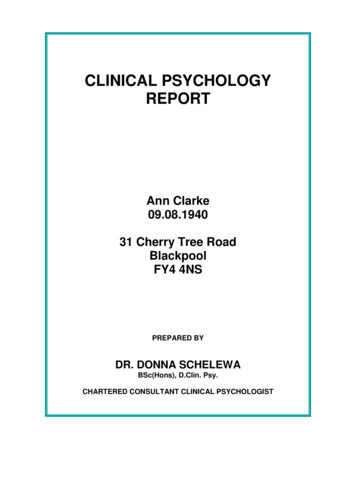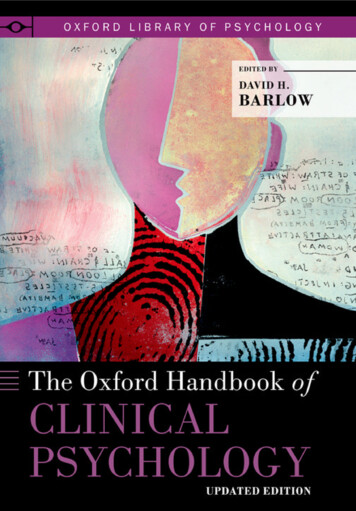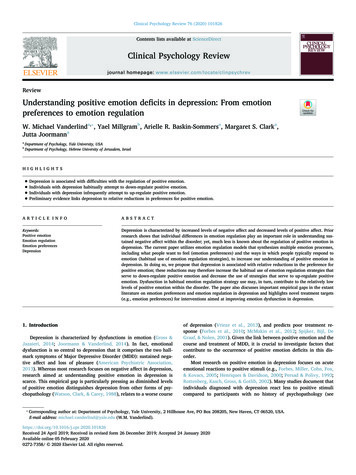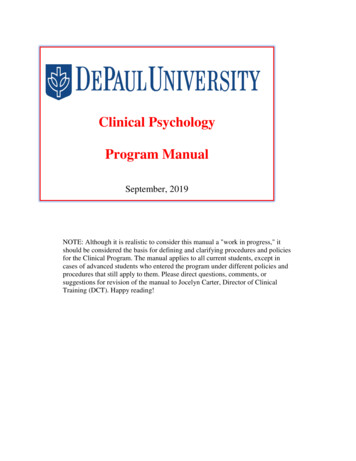
Transcription
Clinical PsychologyProgram ManualSeptember, 2019NOTE: Although it is realistic to consider this manual a "work in progress," itshould be considered the basis for defining and clarifying procedures and policiesfor the Clinical Program. The manual applies to all current students, except incases of advanced students who entered the program under different policies andprocedures that still apply to them. Please direct questions, comments, orsuggestions for revision of the manual to Jocelyn Carter, Director of ClinicalTraining (DCT). Happy reading!
1. CLINICAL PSYCHOLOGY PROGRAM OVERVIEWThe Clinical Psychology Program is one of four Ph.D. programs in the Department of Psychology atDePaul University. The other doctoral programs are Psychological Sciences (formerly Experimental),Industrial/Organizational (I/O), and Community Psychology. In May, 2011, the DePaul Board of Trusteesapproved the creation of a new college, the College of Science and Health (CSH). The Psychology Departmentis now a part of this college.The American Psychological Association (APA) first accredited the Clinical Program in 1976, and ithas held continuous APA accreditation since then. At the conclusion of its most recent accreditation review in2017, DePaul’s clinical program was awarded accreditation. The next self-study is due in May of 2020 with thenext site visit planned for the fall of 2020.DePaul University is a private, Catholic, urban educational institution operated in the tradition of St.Vincent de Paul. The University’s mission is“to strengthen the dignity of each individual and to impact societal systems for the betterment of ajust and humane community The Vincentian quality of DePaul opens the heart as well as themind to the basic dignity of each person and the corresponding duty to respond to the needs ofthose least able to provide for themselves. DePaul’s urban character makes it an active participantin the life of the community of greater Chicago, both drawing from and contributing to this largercommunity.” (Meister, R. A strategic plan for DePaul University: 1995-2000. DePaul University,1995, p. 2).The 2009 edition of the DePaul Graduate Student Handbook articulates the university’s continuingcommitment to public service in its description of Vincentian Character:DePaul takes its name from Saint Vincent de Paul, a French priest who lived in the 17th century.The "Vincentian" religious community founded by St. Vincent established the university andendowed it with a distinctive spirit: to foster in higher education a deep respect for the God-givendignity of all persons, especially the materially, culturally, and spiritually deprived; and to instillin educated persons a dedication to the service of others. The people of DePaul University haveretained this unique spirit as a highly valued heritage and vital influence in every succeedinggeneration of the university's development.The Clinical Program trains students within a scientist-practitioner model, emphasizing training in bothresearch and practice. The Clinical Program has four broad program aims. First, we strive to educate studentsbroadly and generally about psychology and instill a commitment to life-long learning. Second, we aim toprepare graduates with knowledge and skills to engage in and shape research and scholarship. Third, we aim toprepare graduates for diverse career paths in the practice of clinical psychology and more in-depth preparationin child and/or community applications and policy. Fourth, we aim to prepare graduates to work in the publicsector, in an urban environment, with diverse ethnic and socio-economic populations, and with those who havebeen traditionally underserved by psychology. Specific competencies that support these aims include: ethicaland legal standards, individual and cultural diversity, professional values and attitudes, communication andinterpersonal skills, psychological assessment, psychological intervention, supervision, and consultation andinterprofessional/interdisciplinary skills. Our program’s diversity focus is intended to promote students’understanding about the societal and systemic/ecological forces that have contributed to current manifestationsof inequality for poor, urban, and ethnically diverse populations and on how these conditions influence mentalhealth, family/community processes, and access to adequate mental health services.9/4/192
Students in both the Child and Community tracks receive training to become clinical psychologists, andthey are provided with clinical experiences to develop these skills such as training in testing, assessment, andpsychotherapy. However, the two tracks have different emphases which are evident in the differences in theirrequired courses. Child track students take courses in Family Therapy, Treatment Methods with Children, andPsychotherapy Research Methods. Community track students take Fieldwork, Grant Writing, Prevention andIntervention, and Consultation. Applicants select an area of emphasis at the time of admission and are admittedto one of the two tracks. The two areas of emphasis are complementary to one another and students often takecourses across tracks as electives. It is the policy of the Psychology graduate programs not to accept Ph.D. orPsy.D. applicants who are interested in retraining from one psychological specialty to another.In the fall of their first year, students are assigned a faculty advisor. Students in both tracks typicallywork with their research advisor in a mentorship model to develop their Master’s research. Students often retainthe same research advisor throughout their graduate program; however, all students are free to change advisors,based on their interests and compatibility.All students in good standing receive funding from the psychology department during the first threeyears of graduate study. Funding packages include a full tuition waiver plus an academic-year stipend. Studentswork 20 hours per week as research and/or teaching assistants in return for financial assistance. Advanced(usually fourth year and beyond) students have the opportunity to teach undergraduate courses, work in theclinic, or receive Doctoral Research Fellowship money.As of the fall of 2019, the Psychology Department has 33 full-time, tenured or tenure-track facultypositions. The Clinical Program has 12 full-time, tenured or tenure-track faculty members, 7 in the Communityarea and 5 in the Child area. This number includes one full-time, tenured research professor who mentorsstudents in research but does not teach courses. Several adjunct faculty teach courses, supervise students inresearch and practica, and/or serve on thesis and dissertation committees. The Director of Clinical Training(DCT) provides administrative leadership to the Clinical Program. Much of the practicum training for studentsin the Clinical Program occurs in the DePaul Family and Community Services (FCS) Center, which is located inthe same building as the Psychology Department. Several clinical faculty members, as well as FCS staffpsychologists, supervise students in the FCS.The Clinical Program is designed for students to be able complete all degree requirements in five years,including three years of full-time coursework, one year of dissertation research, and a one-year full-timeinternship. During the first year, students take foundational classes in discipline-specific knowledge and clinicalskills. They also begin planning their Master’s research. In the second year, students participate in the first ofthree years of required clinical practica. They also are expected to plan and carry out their Master’s research,and they continue their required coursework. Students begin to take courses in Community and Child areas ofemphasis in addition to general program requirements. Third year students are expected to complete theirrequired courses, obtain advanced training in research and clinical skills, and, ideally, take comprehensiveexaminations. Assuming students are moving through the program on schedule, the focus of the fourth year ison completion of the dissertation. In addition, students continue to refine clinical and research skills. Advancedstudents with Master’s degrees may elect to teach undergraduate courses under faculty supervision, both toenhance their teaching skills and as a source of financial support. For students meeting the recommendedtimeline, the fifth year involves the completion of a full-time paid internship in a setting that has beenaccredited by the American Psychological Association. Although the timeline allows students to finish alldegree requirements in five years, the most common timeframe to complete the program is six years, whichallows students to take advantage of additional research, scholarly, and/or practicum experiences. More detailson recommended and required timelines of training, as well as the schedule of activities for the five- and sixyear models, are provided in later sections of this manual.2. CURRICULUM9/4/193
The curriculum plan for the DePaul Clinical Psychology program adheres to the APA Standards ofAccreditation for Health Service Psychology programs, which specify that all students obtain basic training inthe breadth of scientific psychology which serve as the foundation for specialized training in practice and otherprofessional activities es/standards-of-accreditation.pdf). Asone means of achieving this goal, DePaul students are required to take courses in affective, biological aspectsof behavior, cognitive aspects of behavior, developmental, and social aspects of behavior. Students must alsoacquire and demonstrate competence in research, ethical and legal standards, cultural diversity, professionalattitudes and behaviors, communication and interpersonal skills, assessment, intervention, supervision, andconsultation and interdisciplinary skills. As one means of achieving this competence, students take courses instatistics, research methods, ethics, diversity, professional development, child and adult assessment,psychotherapy and behavior modification, and community psychology. Students also fulfill these requirementsthrough practicum and research milestone requirements as well as through research and teaching assistantships.The faculty teach professional attitudes, behaviors, and values and communication and interpersonal skills bymodeling and promoting continued professional development, participation in professional associations,scholarly presentations and writing, and peer consultation. DePaul ensures that students receive adequate andappropriate practicum experiences by requiring three years of supervised practica, including a structuredsequence of clinical experiences.In addition to meeting APA accreditation guidelines, DePaul's Clinical Program requirements aredesigned to prepare graduates to obtain licensure in Illinois and in many other states. Nonetheless, studentsplanning to seek licensure in states other than Illinois should check licensure requirements in those states toensure that they take coursework that would prepare them to be licensed. Students are encouraged to keep trackof their practicum and internship experiences using a registry service that will facilitate licensure across statelines (e.g., https://www.nationalregister.org/).Degrees, Credit Hours, Registration, and Enrollment RequirementsStudents receive a Master of Arts degree and a Doctor of Philosophy degree as part of the clinicaldoctoral program. The M.A. degree is not considered terminal, and students are not admitted for the M.A.program only. A minimum of 74 quarter hours including 4 quarter hours of thesis credit is required for the M.A.degree. The Ph.D. in Psychology entails a minimum of 92 quarter hours beyond the bachelor’s degree. Degreerequirements for the M.A. and Ph.D. are listed in the Appendix and in the DePaul University Course Catalog.Requirements are assigned according to the year of program entry. If the clinical program changes itsrequirements after the student enters the program, students are able to request a new requirement term byemailing the graduate coordinator. The graduate coordinator also maintains a document that allows each studentto track their course progress as they move throughout the program: Course History Checklist and PlanningGuide.Beginning in the fall of 2015, the required curriculum for the Clinical Program changed by reducing thenumber of required hours to complete the Ph.D. program from 106 to 92quarter-credit hours. In addition, tworequirements relating to a prevention and intervention course in the community track and completion of thehistory and systems requirement) were modified in the spring of 2011.DePaul University is on a quarter system that includes three, 11-week quarters from September to Juneeach year. No formal coursework is offered during the summer in the Clinical Program, but practicumplacements often begin in July. The course load is the heaviest in year one, when students typically carry 16hours per quarter. Most courses earn 4 credit hours each. Students begin practicum in year two, when theytypically carry 8-12 hours per quarter plus practicum. The course load is the lightest in year three, when thetotal course load is 16 hours (0-8 hours across quarters) plus practicum. Students continue in practicum in yearfour and take a required, 0-credit course to support their completion of requirements (Dissertation Seminar). Inaddition to courses, students complete 4 quarter hours of Master's thesis and 4 hours of dissertation.9/4/194
International students need to obtain information about and consult with the Psychology Department and theDCT regarding any restrictions or requirements relating to their academic and training activities.Zero Credit Courses. In order to access university services and maintain active student status, studentsmust maintain registration every Autumn, Winter, and Spring quarter until the Ph.D. is awarded. In addition,students are required to sign up for several zero-credit courses to document their involvement in degree-relatedresearch, practicum, and internship. The specific zero-credit courses required are as follows: Thesis Seminar (PSY 590, 0 credits) in the three academic quarters (Autumn, Winter, and Spring) inyear 1.Introduction to Clinical Skills, Consultation, and Supervision (PSY 499) in the three academic quarters(Autumn, Winter, and Spring) in year 1.Practicum Three quarters of Practicum (PSY 577, 578, and 579, 0 credits) are required in year 2, taken inAutumn, Winter, and Spring, respectively. Three quarters of Practicum (PSY 582, 583, and 584, 0 credits) are required in year 3 taken inAutumn, Winter, and Spring, respectively. Three quarters of Practicum (PSY 574, 575, and 576, 0 credits) are required in year 4 taken inAutumn, Winter, and Spring respectively.Dissertation/Professional Development Seminar (PSY 598, 0 credits) in the three academic quarters(Autumn, Winter, and Spring) in year 4.Internship in Clinical Psychology (PSY 596, 0 credits) in the Autumn, Winter, Spring, and in whichevertwo sessions of Summer coincide with the internship start and end dates, respectively.Students will register for additional zero-credit courses as needed to ensure the appropriate enrollment status(full-time (FT) 8 credits, part-time (PT) 4 credits; financial aid eligibility requires at least PT status,although some funding bodies require FT status). 595 Graduate Research: as needed to maintain FT status until degree conferral (Master’s or Doctoral).Satisfies 8 credit-hour equivalent financial aid requirement for students not enrolled in sufficient creditbearing courseso International students must be enrolled in at least 8 credits (or their equivalent) during the entireyear (main session summer sessions)o Domestic students must be enrolled in at least 8 credits (or their equivalent) during the mainacademic session (AQ, WQ, SQ)o Domestic students who are applying for financial aid over the summer must also be enrolled inat least 8 credits (or their equivalent) during both summer sessions (I and II) Although most loan-granting agencies require proof of enrolment only during themain academic session, some also require this proof during summer sessions,regardless of whether students apply for summer aid. It is the student’sresponsibility to ensure that they know and comply with their loan reportingrequirements; this includes whether to enroll in PSY 595 during summer sessions. 702 Non-Resident Candidacy Continuation: as needed after completion all requirements exceptdissertation and dissertation defense, for students who have left the university but are continuing tomake progress on their dissertationo Cannot be taken at same time as 599 Dissertation Researcho Cannot be taken at same time as 595 Graduate Research9/4/195
Incomplete Grades. In order to take a full load in the Autumn quarter of any year, students must have nomore than one incomplete grade in formal coursework (does not include research, fieldwork, or practicumincompletes) from the previous academic year. When students have more than one incomplete course, theirquarterly course load is reduced by one course. For example, if a student has two incomplete courses, the studentwill take one less course than typical in the subsequent quarter. The student will have such a reduced load foreach subsequent quarter until no more than one incomplete remains. Incompletes are considered completed oncethe instructor submits a change of grade request. For circumstances beyond a student's control, the instructor mayrequest a waiver on behalf of the student. The waiver request will be made to the DCT, who will present therequest to the clinical faculty for review. A majority vote of the clinical faculty will decide the outcome of therequest.Beginning in the fall of 2003, the university instituted a new policy regarding incompletes, which statesthe following: “At the end of the quarter following the term in which the incomplete grade was assigned, allremaining incompletes will automatically convert to ‘F’ grades (end of Winter quarter for Autumn quarterincompletes; end of Spring quarter for Winter Quarter incompletes; end of Autumn quarter for Spring quarterand Summer session incompletes).” This policy applies to Clinical Program students. Thus, students need to bevigilant in resolving all incompletes within one quarter of receiving them.Withdrawing from Courses. The clinical program treats withdrawal grades in courses in the samemanner as the incomplete grades described above.Minimal Levels of Achievement and Competency-Based Education. The clinical program uses grades incourses and assignments within courses to assess students’ minimal levels of achievement (MLA) in disciplinespecific knowledge and profession-wide competencies. In most cases, competency is demonstrated throughobtaining a grade of B or above which corresponds to 87%. Students who obtain assignment grades lowerthan B in any courses designated as demonstrating Discipline Specific Knowledge or Profession WideCompetencies will be required to meet with the DCT and the instructor to develop an intervention plan todevelop competency and obtain the MLA. Students who are unable to obtain the coursework MLAs afterintervention will be dismissed from the program. Full details regarding the demonstration of competency incourses can be found below and in a memo circulated to faculty on August 2nd, 2019.The mission of the Clinical Psychology PhD Program at DePaul University is trains students within a scientistpractitioner model, emphasizing training in both research and practice. To ensure exceptional education andtraining, the Program has adopted a competency-based model for graduate learning. Within this model, studentsare expected to obtain a high level of competence across research, clinical, and professional domains, withspecifi
requirements for the M.A. and Ph.D. are listed in the Appendix and in the DePaul University Course Catalog. Requirements are assigned according to the year of program entry. If the clinical program changes its requirements after the student enters the program, students are able to request a n
